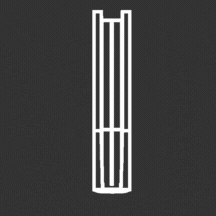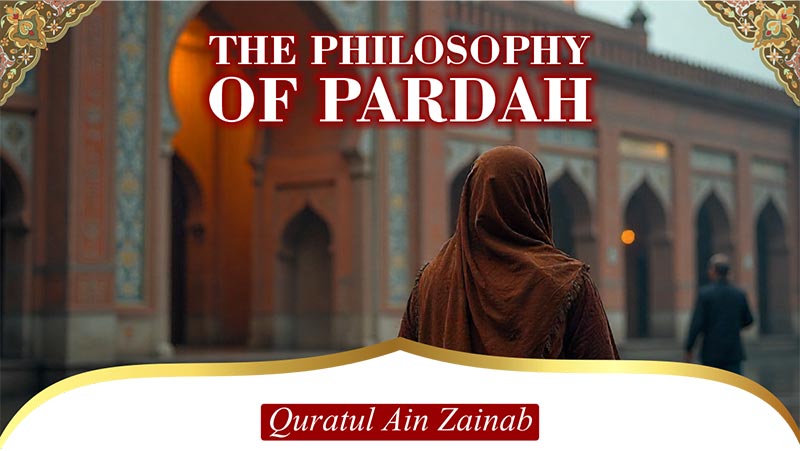يٰأيُّهَا النَّبِيُّ قُل لِّأَزْوَاجِكَ وَبَنَاتِكَ وَنِسَاءِ الْمُؤْمِنِينَ يُدْنِينَ عَلَيْهِنَّ مِن جَلَابِيبِهِنَّ ذَٰلِكَ أَدْنَىٰ أَنْ يُعْرَفْنَ فَلَا يُؤْذَيْنَ وَكَانَ اللَّهُ غَفُورًا رَّحِيمًا.
(Surah Al-Ahzab 33:59)
O Prophet! Ask your wives, your daughters and the women of the believers to draw their cloaks over themselves (when they go out). It is more likely that this way they may be recognized (as virtuous women), and may not be hurt. And Allah is Most-Forgiving, All-Merciful.
Respected readers of Dukhtaran-e-Islam, Pardah is not just a piece of cloth—it is the crown of honor that Allah has placed upon the heads of believing women. It is a priceless gift from our Creator, a shelter in the storm and a key to the treasure of dignity. In Surah Al-Ahzab (33:59), Allah lovingly commands the women of faith: “…that they should draw their outer garments over themselves; this will be better, so that they may be recognized and not harmed.” This divine command calls us to cover ourselves so that we may be known for our respect and kept safe from haram. Pardah is far more than a burqa or a scarf; it is a way of life that guards the heart, lowers the gaze, and keeps society on the straight and narrow. When a woman keeps her beauty for Allah’s eyes alone, she turns a new leaf for her own soul and lights the path for others. Her modesty speaks louder than words, quietly breaking bad habits and cooling the fire
of wrongful desires around her. Pardah is not a chain but a shield of freedom, allowing a woman to walk with her head held high and to be valued for the jewels of her mind, faith, and noble character. It is our badge of honor and our silent call to goodness in a world where true worth is often hidden behind a veil of illusions.
The Prophet ﷺ said:
“Modesty (haya) is a part of faith.”(Sahih al-Bukhari, Hadith 9)
This blessed saying reminds us that every act of modesty is a living sign of faith. Pardah is not a cage that locks a woman; it is a garden that protects her fragrance. It allows her soul to bloom without fear of being plucked by the careless glances of the world. Through Pardah, a Muslim woman tells the world,
This is the real philosophy of Pardah: a path that begins with cloth but blossoms into character, courage, and community change. In its folds lies the promise of a society where dignity is protected, faith is honored, and women shine—not by being seen, but by being truly valued.
These words of Allah echo in our hearts: “That they may be recognized and not harmed” (Al-Ahzab 33:59). This is not just a
command—it is a promise of love and protection from the Lord who created us. Pardah is His gentle way of saying, “You are precious.”
According to Al-Ḥākim in al-Mustadrak (Hadith 4763), this moving incident is also authentically reported. He narrates that when Sayyidah Fāṭimah az-Zahrāʾ (RA) felt her blessed life was nearing its end, she expressed a unique wish to Asmā’ bint ʿUmays (RA). She said:
“Indeed, I feel shy that my body will be exposed on the bier when men carry my funeral.”
Her concern was not about life’s hardships, but about maintaining pardah even after death. Asmā’ (RA) comforted her and showed a way to cover the bier completely with a canopy-like coffin (taabūt)—a method she had seen used in Abyssinia. When Fāṭimah (RA) saw it, her face lit with peace and she said:
“How beautiful and modest this is. Please arrange my funeral in this manner.”
This loving request became the practice for Muslim women’s funerals thereafter, preserving their dignity even in death.
The Waqia of Umm Salamah (RA) and the Revelation of Pardah
When the verse of pardah was revealed —
يَا أَيُّهَا النَّبِيُّ قُلْ لِأَزْوَاجِكَ وَبَنَاتِكَ وَنِسَاءِ الْمُؤْمِنِينَ يُدْنِينَ عَلَيْهِنَّ مِنْ جَلَابِيبِهِنَّ.
“O Prophet! Tell your wives and your daughters and the women of the believers to draw their cloaks over themselves …” (Surah Al-Ahzab 33:59)
— the women of Madinah immediately responded with love and obedience.
Sayyidah Umm Salamah (R.A), the noble wife of the Prophet ﷺ, narrates:
لَمَّا نَزَلَتْ هَذِهِ الْآيَةُ يُدْنِينَ عَلَيْهِنَّ مِنْ جَلَابِيبِهِنَّ خَرَجَ نِسَاءُ الْأَنْصَارِ كَأَنَّ عَلَى رُءُوسِهِنَّ الْغِرْبَانُ مِنَ السَّكِينَةِ وَعَلَيْهِنَّ أَكْسِيَةٌ سُودٌ.
“When this verse was revealed, the women of the Ansar came out as if black crows were on their heads, because of the calmness (of their demeanor) and because they wore black cloaks.”
[Sunan Abi Dawud, Hadith 4101; Musnad Ahmad 6/295]
The Prophet ﷺ praised their readiness and modesty, saying:
This moving scene shows that the women of the Ansar never saw pardah as a chain or a weight on their lives. Instead, they welcomed it as a gift of honor and a mark of faith.
For them, covering was not about fear; it was about love, respect, and pride in their identity. Each cloak became a declaration: “We belong to Allah, and His command is dearer to us than the fashions of the world.” Their response teaches today’s Muslim women that modesty is not a loss of beauty, but a rise in value.
O courageous daughters of Islam, remember that Pardah is the mirror in which your inner faith shines. It is not merely cloth, but your voice in silence, your dignity in motion, your light in a world that rushes toward display. As Shaykh-ul-Islam Dr. Muhammad Tahir-ul-Qadri beautifully said in his article “The Role of Hijab in Protection and Liberation of Women,” :
“In fact the hijaab is a liberating force, since it allows women to partake fully in society by providing them with confidence and self-assurance about whether she is slim or large, beautiful or ugly (in the eyes of others), her hijaab will provide protection.”
Pardah whispers a message louder than any shout:
“You may see a garment, but my story is written in the ink of eternity by the One who fashioned me.”
The Messenger of Allah ﷺ said:
إِنَّ لِكُلِّ دِينٍ خُلُقًا، وَخُلُقُ الْإِسْلَامِ الْحَيَاءُ.
“Every religion has a distinct character, and the character of Islam is modesty.”(Sunan Ibn Mājah, Hadith 4181)
May every step you take in Pardah become a step closer to His mercy, a shield against harm, and a radiant proof that the daughters of Islam carry honor as their ornament and faith as their crown.



